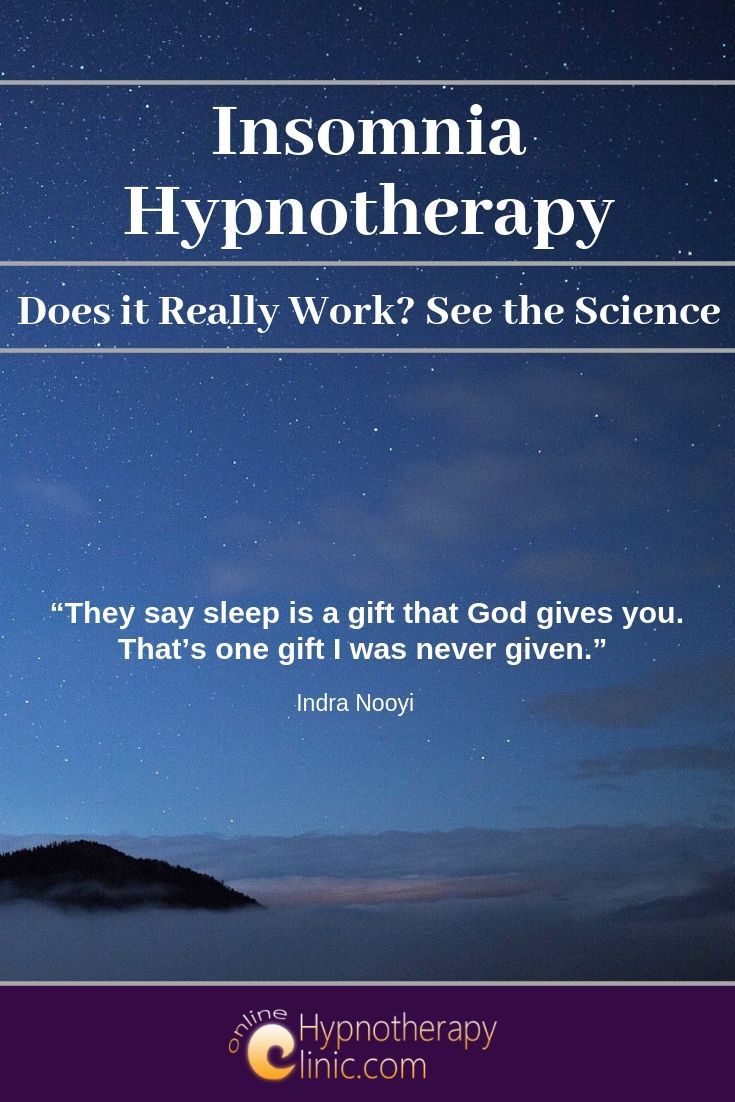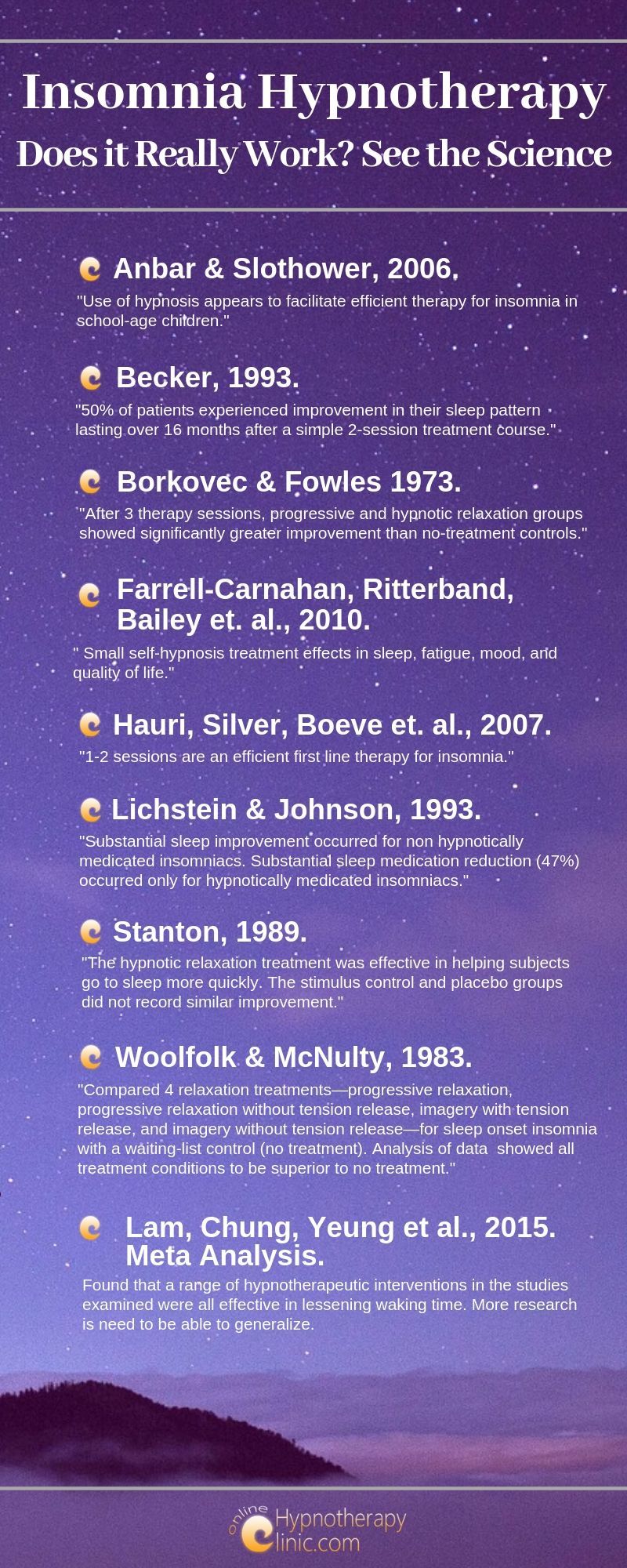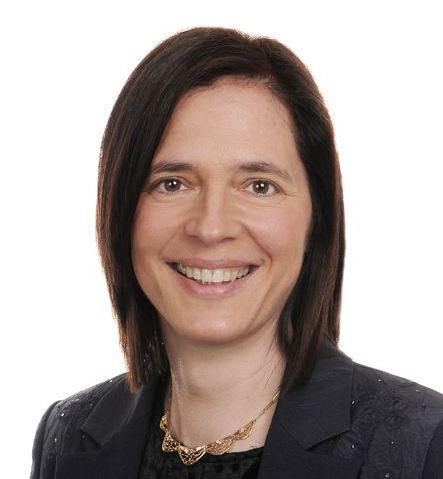Insomnia Hypnotherapy- Does it Really Work? See the Science
Plus How You Can Get the Best From Your Treatment
By Susanna Sweeney, MSC, MBACP, CHT
You are probably interested to see if insomnia hypnotherapy could be for you. You have come to the right place. I have compiled a series of articles on this topic. This article is devoted to giving you the scientific background of hypnosis for insomnia. You can find links to the other articles further down the page.
First things first- you should always consult your doctor first and rule out any possible medical causes. If you have an over functioning thyroid, for example- that would disturb your sleep.
Making a treatment plan together with your doctor, you may well include complementary medicine and hypnotherapy.
Research Studies on Insomnia Hypnotherapy
There aren't many studies on the efficacy of insomnia hypnotherapy. This mirrors the general lack of research on clinical hypnosis. I have noted the same in my articles "Stop Smoking Hypnosis- What Science Says" and "Weight Loss Through Hypnosis- What Science Says".
All in all it has to be said- there is little interest in research on the clinical applications of hypnosis- which is a pity, to say the least because hypnotherapy holds many promising possibilities. In many areas, hypnosis could contribute to reducing the use of prescription drugs, for example.
In the few studies that I managed to find, however, there is little disagreement about hypnosis for insomnia having beneficial effects for insomnia sufferers. This makes sense because naturally, relaxation- which is required for going to sleep- is at the very heart of hypnosis.
Here are some scientific findings on hypnosis for insomnia:
Meta study and review on insomnia hypnotherapy:
- To start with, a recent review of the available research on sleep hypnosis across 24 studies, found hypnosis to produce significant improvements in sleep in 58.3% of cases.
- The only ever meta-analysis carried out on insomnia hypnotherapy, ( Lam, Chung, Yeung et. al. 2015 (12)) found that a range of hypnotherapeutic interventions were all effective in lessening waking time, but concluded that more research was needed to be able to generalize as this meta analysis was based on only six studies.
Individual Studies on Hypnotherapy for Insomnia
Abramowitz, Barak, Ben-Avi & Knobler, 2008 (1)
This study reports on the use of insomnia hypnotherapy with 32 combat veterans who also suffered from PTSD.
Results: "There was a significant main effect of the hypnotherapy treatment with PTSD symptoms as measured by the Posttraumatic Disorder Scale. This effect was preserved at follow-up 1 month later. Additional benefits for the hypnotherapy group were decreases in intrusion and avoidance reactions and improvement in all sleep variables."
This study reports on the use of insomnia hypnotherapy with schoolchildren. The study reports a high degree of resolution of the insomnia issue in the different client groups.
Results: "Use of hypnosis appears to facilitate efficient therapy for insomnia in school-age children."
Becker, 1993. (3)
This study reports on six case studies where insomnia hypnotherapy led to improvements in subjects' sleep patterns "lasting for over 16 months after a simple 2-session treatment course."
Borkovec & Fowles 1973. (4)
In a study of 37 female college students the researchers found progressive relaxation and hypnotic relaxation to show significant improvement in sleep patterns, while the no-treatment group showed no improvement.
Farrell-Carnahan, Ritterband, Bailey et. al., 2010. (5)
Self hypnosis showed small treatment effects for sleep, fatigue, mood and quality of life and most participants perceived it as "at least somewhat helpful".
Hauri, Silver, Boeve et. al.2007. (6)
In a 5 year follow up study the researchers concluded that "1-2 sessions are an efficient first line therapy for insomnia".
Lichstein & Johnson, 1993. (7)
57 older women, some on medication for hypertension and some not, received a course of three relaxation therapy. Of those on medication, 47% were able to reduce medication after treatment while those not on medication experienced significant sleep improvement.
Ng & Lee, 2008. (8)
in this review of studies on hypnosis for insomnia, the authors conclude that: "Acute and chronic insomnia often respond to relaxation and hypnotherapy approaches, along with sleep hygiene instructions. Hypnotherapy has also helped with nightmares and sleep terrors."
Serban, Padurariu, Ciobica et. al., 2013. (9)
Authors conclude that: "Since the current means of pharmacologic treatment for insomnia present significant limitations, especially when treating chronic insomnia, a more suitable alternative could be attained by non-pharmacological approaches such as hypnosis. "
Stanton, 1989. (10)
45 subjects were randomly assigned to hypnotic relaxation, stimulus control, or placebo groups. Results: " The hypnotic relaxation treatment was effective in helping subjects go to sleep more quickly. The stimulus control and placebo groups did not record similar improvement."
Woolfolk & McNulty, 1983. (11)
Studied relaxation treatments in 44 insomniacs and found that image based relaxation treatments (hypnosis) were slightly superior while all forms of relaxation treatment were superior to no treatment.
How You Can Get the Very Best from Your Treatment
Some recommendation emerge from the research I cited above on how to best use insomnia hypnotherapy. These are useful to consider so that you can get the very best from your treatment.
These recommendations are:
- Often, the recommendation emerges to use hypnosis for insomnia in conjunction with other forms of therapy for insomnia, and not to rely on hypnosis alone to fix the issue.
- Education on and implementation of proper sleep hygiene is deemed essential alongside. Of course this makes perfect sense. Your entire life style has to support a healthy sleeping pattern. Hypnosis is not a miracle cure (if you believe it to be- this comes in under hypnosis myths) and cannot solve the issue for you if you don't support yourself in every way you can. You can brush up on sleep hygiene in my article on self help for insomnia.
- Cognitive behavioral therapy is deemed very useful for many insomnia sufferers- if you find it difficult to change your behaviors around sleep and sleep hygiene, do consider talking to your doctor about such a referral. CBT, of course, works very well in conjunction with hypnosis. (13)
- There are different types of hypnosis treatments for insomnia. The type of treatment that helps you to relax to send you off to sleep is very useful for mild to medium severity of insomnia. This form of treatment is called suggestion hypnosis.
- If you suffer from severe insomnia, you should make sure to make regression hypnosis part of your treatment to deal with any underlying issues that may be causing your nervous system to be in chronic hyperarousal. These issues can include PTSD, anxiety, depression and similar mental health issues.
More About Healing with Hypnotherapy
More About Healing with Hypnotherapy
Hypnosis and Trauma
What are the most suitable trauma tools in the hypnosis world? What should you look for in a hypnotist if you want to use hypnosis to deal with trauma?
Free Yourself From Depression With Hypnosis
Hypnotherapy for Mental Health
Find out why hypnotherapy is so well suited to reducing and ultimately clearing mental health symptoms such as anxiety, depression and low self esteem symptoms.
Depression Self Help- The Ultimate Guide
This comprehensive guide introduces you to easy and effective concepts, tools and processes you can use at home to help improve your symptoms of depression.
Depression Hypnosis- 7 Major Benefits for You
Depression hypnosis is often the last option considered on a long list of depression interventions. In this article I will make the case for seven major benefits in store for you when you choose to work with depression hypnosis.
Hypnotherapy for Depression- Jason's Story
In this article, meet Jason- a client who attended me for hypnotherapy for depression. His story is designed to give you a good, realistic feel for the 'before and after' snapshots, so that you know what you can expect from hypnotherapy for depression.
Hypnosis for Depression- Jason's Journey Towards Recovery
Find out what a typical journey of recovery from depression looks like when you use a thorough hypnotherapy program.
Self Hypnosis for Depression- 9 Major Benefits for You
Self hypnosis for depression is a much underrated self help tool. In this article I will make the case for nine major benefits for you if you decide to use this fantastic self help tool.
Improve Your Self Esteem With Hypnotherapy
Find out tools, tips and ten steps on how you can support yourself in building your self esteem.
Self Esteem Hypnosis- Does it Really Work?
In this article i discuss the available scientific evidence that backs self esteem hypnosis, present a client case study that demonstrates how hypnosis for self esteem can change your life, and finally outline five major benefits of self esteem hypnosis.
Hypnosis for Self Esteem- Why Most People Should Consider it
Here, I make the case for self esteem hypnosis to be used as a cornerstone of any hypnosis program. Find out why...
The Most prominent benefits of self esteem hypnosis which can help you change your life for the better.
Boost Your Confidence With Hypnosis
Hypnosis for Confidence- A Success Story
This article gives you an insight into client work and how confidence hypnosis helps people change their lives.
Confidence Hypnosis- Could it Benefit You?
In this comprehensive article, find out what confidence hypnosis is, how it works and what it could do for you.
Find out if self hypnosis is the right tool for you for building confidence.
Get Rid of Fears and Phobias With Hypnosis
Hypnosis for Fears and Phobias- How it Can Help You
Hypnosis for fears and phobias is a fast, efficient and safe way to help you become symptom free and regain your quality of life. In this article learn what causes fears and phobias, how they present, how hypnotherapy can help and what scientific findings exist.
Improve Your Sleep
Learn how to reset your life for regular, peaceful sleep in 10 easy steps.
Find out 7 tremendous benefits this work could hold for you.
Insomnia Hypnotherapy- Does it Really Work?
Find out the science behind hypnotherapy for sleep.
7 Wonderful benefits sleep hypnosis has in store for you.
Migraine Hypnosis
Migraines are a serious issue affecting as many as one in 20 women and one in 15 men. Find out how migraine hypnosis can benefit you as part of your migraine relief plan.
Overcome Stress and Achieve Relaxation With Hypnosis
Hypnosis for Stress- Get Your Equilibrium Back
This article is designed to introduce you to hypnosis for stress relief, to what it is, why it is a suitable tool for overcoming toxic stress and on what it can do for you.
Hypnotherapy for Stress- A Success Story
Follow my client Jeffrey from being totally stressed out to getting back in charge of his life. See what's involved with hypnotherapy for stress reduction so that you can decide if you might want to give it a go.
Self Hypnosis for Stress- 5 Major Gains for You
See how you could benefit from self hypnosis for stress.
Find out how hypnosis for relaxation compares to other relaxation methods such as relaxation music and guided visualization.
How Relaxation Hypnosis Can Help You Change Your Life
This article is designed to introduce you to relaxation hypnosis, its benefits, how it works and why it may be help you to change your life.
How Relaxation Self Hypnosis Can Benefit You in 6 Ways
Find out how you could benefit from self hypnosis for relaxation so that you can decide if it is right for you.
Self Hypnosis Relaxation Techniques for You
Learn self hypnosis relaxation techniques that you can start to use at home today.
I hope you have found this article on insomnia hypnotherapy educational and useful. in the comments underneath, let our community know if you have learned something new, or simply how you are getting on.
Here is to your restfulness and well being.
Regards,

References
1. Abramowitz, Barak, Ben-Avi & Knobler, 2008. Hypnotherapy in the Treatment of Chronic Combat-Related PTSD Patients Suffering From Insomnia: A Randomized, Zolpidem-Controlled Clinical Trial, International Journal of Clinical and Experimental Hypnosis, 56:3.
2. Anbar & Slothower, 2006. Hypnosis for treatment of insomnia in school age. BMC Pediatrics 6, 23.
3. Becker, 1993. chronic Insomnia: outcome of hypnotherapeutic intervention in six cases. American Journal of Clinical Hypnotherapy, 36, 98-105
4. Borkovec & Fowles 1973. Controlled investigation of the effects of progressive and hypnotic relaxation on insomnia. Journal of Abnormal Psychology, 82(1), 153-158.
5. Farrell-Carnahan, Ritterband, Bailey et. al., 2010. Feasibility and preliminary efficacy of a self-hypnosis intervention available on the web for cancer survivors with insomnia. Electronic Journal of Applied Psychology. 6(2): 10-23
6. Hauri, Silver, Boeve et. al.2007. The Treatment of Parasomniacs with hypnosis- a 5 year follow up study. Journal of Clinical Sleep Medicine
7. Lichstein & Johnson, 1993. Relaxation for insomnia and hypnotic medication use in older women. Psychology and Aging, 8(1), 103-111.
8. Ng and Lee, 2008. Hypnotherapy for sleep disorders Ann Acad Med singapore 37, 683-8.
9. Serban, Padurariu, Ciobica Et. Al., 2013. The Role of Hypnosis and Related Techniques in Insomnia, Arch. Biol. Sci., Belgrade, 65 (2), 507-510.
10. Stanton, 1989. Hypnotic relaxation and the reduction of sleep onset insomnia. International Journal of Psychosomatics, 36(1-4), 64-68.
11. Woolfolk & McNulty, 1983. Relaxation treatment for insomnia: A component analysis. Journal of Consulting and Clinical Psychology, 51(4), 495–503. doi: 10.1037/0022-006X.51.4.495.
12. Lam, Chung, Yeung et al., 2015. Hypnotherapy for Insomnia: A systematic Review and Meta Analysis of randomized Controlled Trials, Complementary Therapies in Medicine, Vol. 23, Issue 5
13. Kirsch, 1996. Hypnotic enhancement of cognitive-behavioral weight loss treatments—Another meta-reanalysis. Journal of Consulting and Clinical Psychology, 64(3), 517-519.
Recent Articles
-
Havening Technique Training auf Deutsch
Apr 18, 25 02:59 AM
Havening Technique Training auf Deutsch- Details und Buchung -
Client Testimonials
Oct 06, 23 06:08 AM
Client Testimonials of my Online REPAIRenting® Program that uses various psychosensory approaches for safe and quick transformation -
Smoke Free Thanks to This Amazing Resource
Aug 02, 23 09:26 AM
Oh thank you for this simple resolution to all my worries! I feel like I have had a weight lifted off my shoulders. It is like cheating on giving up smoking.




New! Comments
What do you think? Leave a comment in the box below.